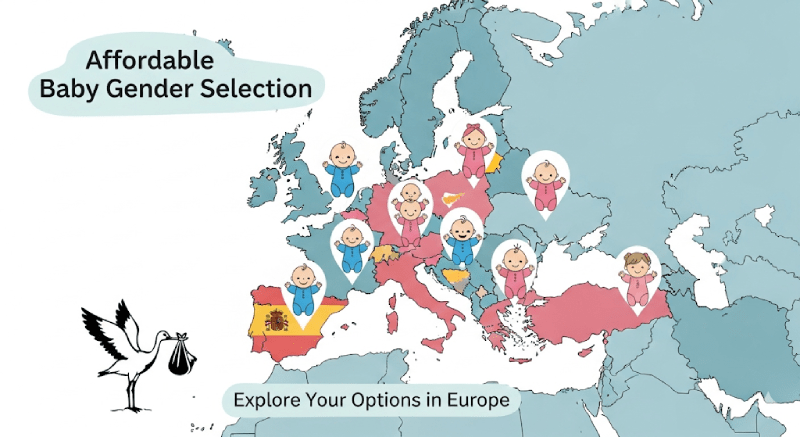This report serves as a comprehensive guide for individuals exploring the medical procedure of gender selection for non-medical reasons (such as family balancing or personal preference) in Europe. The analysis indicates that this type of procedure is legally prohibited or strictly limited in the vast majority of European Union (EU) member states and Turkey. This prohibition is generally based on ethical, social, and legal considerations. In contrast to this restrictive legal landscape, the Turkish Republic of Northern Cyprus (TRNC), geographically located in Europe but not an EU member, stands out as one of the rare destinations that legally permits non-medical gender selection, becoming an international hub for this field.
From a financial perspective, the costs of gender selection vary depending on the method and the clinic used. Centers in the TRNC offer package prices for the main treatment ranging from 2,500 Euros to 6,200 Euros. However, these figures often do not include additional expenses such as medication, accommodation, travel, and other laboratory tests. Therefore, for individuals seeking “affordable prices,” it is crucial to consider all these spending items to accurately calculate the total cost. In the medical process, it is emphasized that gender determination through Preimplantation Genetic Diagnosis (PGD) has a high certainty rate (99.9%), but the ultimate success of the treatment (live birth rate) depends on many biological factors such as age and general health status.
Conceptual Framework and Terminology
Baby gender selection is one of the most controversial yet increasingly accessible applications of modern reproductive medicine. This process is typically based on advanced genetic techniques integrated with In Vitro Fertilization (IVF) treatment.
The Medical Basis of Gender Selection: Preimplantation Genetic Diagnosis (PGD)
The scientific foundation of gender selection is the Preimplantation Genetic Diagnosis (PGD) method, applied before embryo transfer. PGD is a diagnostic procedure that allows for the genetic screening of embryos created in a laboratory setting during the IVF process, before they are transferred to the mother’s womb. This screening includes the analysis of the embryo’s sex chromosomes, X and Y. By biopsying a small number of cells from the embryo, gender information can be determined with an extremely high accuracy of 99.9%. This method not only determines gender but also has the potential to increase the chance of a healthy pregnancy by detecting chromosomal abnormalities like Down syndrome or genetic mutations like hemophilia.
The Distinction Between Medical and Non-Medical Reasons for Gender Selection
Gender selection is divided into two main categories based on the motivation behind the application; this distinction forms the basis of the legal and ethical status of the practice.
- Medical Reasons: This category includes selections made to prevent the occurrence of a specific gender-linked genetic disease, such as hemophilia or Duchenne muscular dystrophy, in the unborn child. For example, a couple at risk of a disease primarily affecting male children due to the X chromosome can avoid this risk by selecting female embryos. Such applications are considered ethically appropriate and legal in most countries.
- Non-Medical (Social) Reasons: This category covers gender selections based on “family balancing” (such as a family with two daughters wanting a boy) or purely personal preference. The Regulation on Assisted Reproductive Treatment Centers and international ethics committees consider such practices an “interference with human nature” and generally find them legally or ethically unacceptable. Selections made for these reasons are the area where legal regulations are most restrictive.
The Legal and Ethical Landscape in Europe
The user’s search for legal options across “Europe” reveals that this term contains significant legal differences in the context of gender selection.
General Situation in the European Union (EU) and Turkey
Most countries in Europe have imposed strict prohibitions on gender selection for non-medical reasons. In major EU countries like Germany, France, the UK, and Italy, the PGD procedure is limited to eliminating the risks of hereditary diseases. In Germany, the Embryo Protection Act in force prohibits gender selection except in exceptional circumstances.
The legal situation in Turkey has a similar framework. The Regulation on Assisted Reproductive Treatment Centers allows PGD only for the selection of embryos at risk of genetic diseases. Gender determination procedures for personal preference or family balancing are considered both unethical and subject to legal sanctions.
The Case of the Turkish Republic of Northern Cyprus (TRNC)
One of the rare centers located geographically in Europe but outside these legal restrictions is the Turkish Republic of Northern Cyprus (TRNC). The TRNC is gaining international attention as a destination that legally permits gender selection for non-medical reasons. This service is usually offered in the TRNC by combining it with the sperm sorting method called MicroSort or with PGD.
The Complexities Behind Legal and Ethical Debates
When examining online sources on the topic, it is seen that the term “gender” is used with different meanings in a legal context. Recently enacted laws in countries like Germany and Spain address issues such as adding a “third gender” option to birth certificates or allowing individuals to change their gender identity based on declaration. These regulations relate to post-birth gender identity and social gender roles and are not directly related to the determination or selection of a baby’s gender before birth. This creates a complexity that requires careful distinction of information from sources.
However, there are also contradictions in the information presented in some sources. For example, one source states that gender selection is prohibited in the UK , while another claims that this procedure is legal in some countries like the UK. This contradiction shows that online information may not always be up-to-date or accurate. The current legal regulations in the UK (such as the Human Fertilisation and Embryology Act) generally prohibit gender selection for non-medical reasons. This emphasizes how important it is to refer only to reliable, verified, and up-to-date sources when researching this topic.
The table below summarizes the legal status of gender selection practices in selected European countries:
| Country | Gender Selection for Medical Reasons | Gender Selection for Non-Medical Reasons |
| Germany | Legal | Forbidden |
| France | Legal | Forbidden |
| UK | Legal | Forbidden |
| Italy | Legal | Forbidden |
| Spain | Legal | Forbidden |
| Turkey | Legal (Limited by Regulation) | Forbidden |
| Northern Cyprus | Legal | Legal |
Cost Analysis and Treatment Packages
The user’s search for “affordable prices” necessitates a detailed analysis of treatment costs. The cost of the gender selection procedure varies significantly between clinics and the techniques applied.
General Cost Structure and TRNC Pricing
IVF clinics in the TRNC generally offer package prices for gender selection. These packages vary according to the method applied :
- Gender Selection with MicroSort IUI: 2,800 Euros
- Gender Selection with MicroSort IVF: 3,700 Euros
- Gender Selection with MicroSort IVF + PGD: 6,200 Euros
In general, IVF treatment costs in the TRNC range between 2,500 Euros and 5,000 Euros. These figures represent a significant attraction point for international patients.
Additional Expenses and Total Cost Planning
While package prices may seem “affordable” at first glance, there are additional expenses that must not be overlooked when planning the total cost. These expenses can significantly impact the user’s total budget and help create a realistic financial expectation.
- Medication Costs: The dosage and type of hormone medications to be used during treatment vary according to the patient’s individual situation, so this cost is not included in the package.
- Laboratory Tests: An additional fee is charged for supplementary laboratory analyses, such as infectious disease tests, which must be performed before treatment.
- Accommodation and Travel Expenses: Couples are required to stay on the island for a certain period to complete the treatment process in the TRNC. Accommodation, airfare, and other living expenses are not included in the treatment package and must be covered by the individuals’ own budget.
The following table demonstrates how the total cost is formed in the TRNC with an example:
| Cost Item | Description | Estimated Cost |
| Treatment Package (MicroSort IVF) | Basic treatment package including gender selection | 3,700 € |
| Laboratory Tests | Infectious disease tests | Approximately 10€ |
| Medication Costs | Hormone and other treatment drugs | Variable |
| Accommodation | Duration of stay on the island during treatment | Variable |
| Airfare and Other Travel Expenses | Transportation costs | Variable |
| Total Cost | Sum of all items | Higher than the package price |
Medical Process, Success Rates, and Risks
To have accurate expectations about the gender selection procedure, it is of great importance to understand the success rates and potential risks.
Success Rates: Certainty and Realism
The PGD gender determination procedure offers a 99.9% certainty in correctly identifying the gender of the embryo. However, this high certainty does not guarantee that the treatment will result in a live birth. Many individuals and couples may confuse the success of gender determination with the overall success of the IVF treatment. The general success rates of IVF treatment depend on many biological factors such as the woman’s age, egg and sperm quality, and uterine health. For example, the success rate for women under 30 is around 45-50%, while this rate can decrease to 15-20% in older ages. Therefore, the correct determination of gender does not guarantee a successful pregnancy, and this distinction should be clearly understood before starting treatment.
Potential Risks and Technical Difficulties
Like any medical procedure, PGD and IVF treatment have some risks and technical difficulties.
- Medical Risks: Even if pregnancy occurs after treatment, there is always a possibility of a miscarriage. Hormone treatments can cause various side effects in women, and embryo transfer is not always guaranteed to be successful.
- Technical Difficulties: The PGD procedure requires delicate laboratory work. Technical problems may arise during embryo biopsy, and situations like faulty signals or signal confusion may be encountered in genetic analysis.
Conclusion and Expert Recommendations
As a result of this comprehensive analysis, it is clear that for individuals seeking gender selection for non-medical reasons in Europe, the most prominent and legal destination is the Turkish Republic of Northern Cyprus. While prices may seem affordable in terms of package fees, it is essential to plan the total budget by considering additional costs (medication, accommodation, travel, etc.).
An expert’s approach should not be limited to presenting only costs or legal statuses. Attention should be drawn to the human and professional factors that are at least as important as financial factors in the user’s decision-making process. Patient reviews show that factors such as trust, professionalism, and empathy are decisive in clinic selection. Elements like high success rates, experienced physicians, and well-equipped laboratories should be considered a more important investment than the cost of treatment. It should be remembered that the lowest-cost option does not always guarantee the most reliable or successful outcome.
Critical Expert Recommendations:
- Detailed Clinic Research: When choosing a treatment center, it is recommended to conduct detailed research on the clinic’s experience, success rates, and patient feedback, not just comparing prices.
- Comprehensive Cost Planning: Before starting treatment, a detailed treatment plan and cost breakdown, including all possible additional costs (medication, accommodation, tests, etc.), should be requested.
- Legal Consultation: Although it is a legal destination, it may be beneficial to seek independent legal consultation before treatment to be sure about legal procedures and rights.
- Realistic Expectations: It should be remembered that high certainty in gender determination does not guarantee a live birth. The potential outcomes, success rates, and risks of the treatment should be openly discussed with the doctor.
Family Planning with Gender Selection
Are you considering expanding your family and have a preference for your baby’s gender? We offer a reliable and affordable gender selection service in Europe. Our mission is to provide you with the support and expertise needed to make this significant decision with confidence and peace of mind.
We collaborate with a network of modern, reputable, and legally compliant healthcare clinics across Europe that adhere to the highest ethical and medical standards. Our experienced team will guide you through every step of the process, ensuring a smooth and stress-free journey.
Contact Us
To learn more about our services and how we can assist you with your family planning goals, please don’t hesitate to get in touch. We are available for a confidential consultation to answer all your questions and provide a tailored plan. Contact Cure Holiday today to begin your journey.



